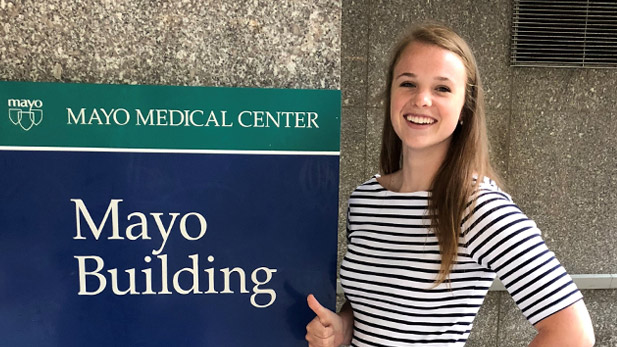Taking a New Bite at the Bug

Senior biomedical engineering major Bailey MacInnis interned at the Mayo Clinic in Rochester, Minnesota, conducting DNA research aimed at finding new ways to battle the flu virus.
Humans have a checkered history with the flu. In milder years, the virus kills around 300,000 people worldwide. In other years, the number of deaths may be double that, while in (thankfully, rare) pandemic years the global death toll can stretch into the tens of millions.
One big challenge to fighting the flu is that the virus is always changing, making it very difficult to develop consistently effective vaccines. That’s why attacking the problem from a genetic angle may offer new hope.
Chasing that hope is what Bailey MacInnis, a senior biomedical engineering major, did during an internship at the Mayo Clinic in Rochester, Minnesota this past summer. She and a team of other researchers delved into how genetic differences influence how a living organism handles the flu virus.
“We found some unexpected things,” MacInnis says.
Surprisingly, they discovered that mice missing a particular gene, known as GADD45B, exhibit few if any flu symptoms when they get the virus.
Led by Dr. Jie Sun, the research is continuing and may shed new light on how to battle the influenza virus. In the meantime, MacInnis is back at Rose-Hulman, finishing her senior year and preparing for medical school.
“Rose and our biomedical engineering professors did a great job teaching us how to design useful experiments and how to present lab work in a professional manner,” MacInnis says.
The experience at Mayo, the nation’s top-rated hospital, was the third internship for MacInnis but her first involving full-time research. And, while research can be fascinating, she found it can also be a real challenge.
“I realized it can be very frustrating,” she says. “At one point, we had to flip everything on its head and start over.”
As of now, MacInnis is unsure which medical school she’ll attend and is still deciding between specializing in pulmonary or orthopedic medicine. Either way, working at the Mayo Clinic was great preparation for whatever lies ahead.
“Interning at the Mayo Clinic was a once in a lifetime opportunity,” MacInnis says. “I am grateful for the lessons this experience taught me and look forward to carrying these into my future medical career.”